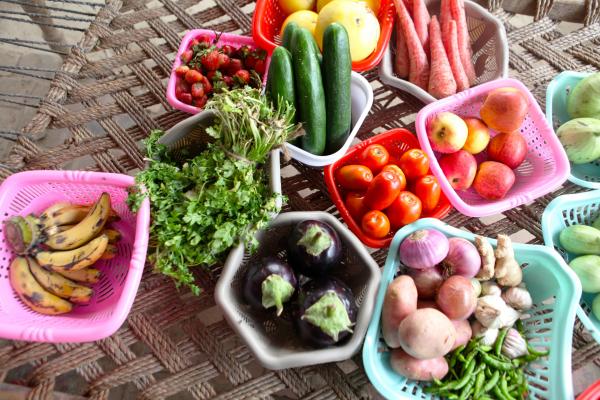
BY ABEBE WOLDEGIORGIS
Ensuring food security is a substantial aspiration for the nation but side by side with this, efforts should be exerted to nutrition security. Stunting due to lack of sufficient nutrition critically affects children’s physical and mental status which resulted in low productivity capacity in their later age. The prevalence of stunt citizens also imposes adverse impact on the nation’s Gross Domestic Production (GDP).
While announcing the Ethiopian food system plan which is prepared by both the federal and regional governments recently, the Minister of Agriculture Umer Hussein said that the preparation took six months. The plan is expected to be endorsed by the government.
It is spearheaded jointly by the Ministry of Health and Ministry of Agriculture with high participation of other partners.
According to the Minister of Agriculture, the Ethiopian food and nutrition system connects various chains and comprises many stakeholders. It holds producers, brokers, traders, food caters and consumers.
Therefore, to make the value system proper and functional, coordination between stake holders is essential. Currently, the system serves more for ensuring food security rather than nutrition security. Hence, in order to close this gap, restructuring and changing the system can bring various benefits to the world. Ensuring sufficient nutrition to citizens through increasing productivity without compromising the environment protection helps to attain better living condition, sustainable development, peace and partnership.
As to Umer, considering the global value of ensuring nutrition security, the United Nations Nutrition summit will take place in New York in the coming September, which focuses on changing the nutrition value chain.
The summit is expected concentrate on five pillars which include: supplying foods enriched by minerals to all citizens sustainably; educating the society to enhance its awareness about nutrition system; enhancing sufficient food production without compromising the natural resources coupled with ensuring gender equality and establishing a system which serves to contain natural disaster and reduce risk among others.
The government, in collaboration with the Ministry of Agriculture and the Ministry of Health, carried out various tasks to study the challenges which hamper the nutrition system. It made various meetings with stakeholders such as the US agencies, Universities, the private sector, other professionals and totally, more than 120 people were participated the meeting and finally forwarded solutions to overcome the challenges.
It put directions which go in line with the United Nations tools which accelerate restructuring the nutrition value system in a game changing manner.
86 solution directions that are going to be implemented forwarded during the first round and out of them 22 are selected for further scrutinizing. These again reorganized in 6 clusters.
The clusters focus on producing food enriched by nutrition without aggravating land resource degradation and global warming, ensuring food security, enhancing energy supply and more over strengthening food value chain and expanding education which brings cultural change in food consumption.
On the other hand, improving land policy to make the land holding system so that farmers to feel tenure security and strengthening financial support. Providing agricultural technology through innovation and increasing inputs are considered as key.
Boosting market and information system, accelerating reaching consumers and specialization also categorized as helpful. The government’s 10 years perspective development plan aspires to meet the goals through various sectors and ensuring nutrition security is part of it.
The Minister of Health, Dr. Lia Tadesse on her part said that the government’s efforts to improve the nutrition system and addressing the problems of stunting continued from 1992 to 2021 brought some tangible results.
Stunting is reduced from 58 percent to 37 percent so far. Under weight children also reduced from 41 to 21 percent. Mental retardation due to lack of nutrition is reduced from 12 to 7 percent. However, the rate of stunting as compared to other Sub Saharan African countries is still very high due to nutritious food insecurity.
Study conducted in 2016 indicated that there is high nutrition deficiency in Ethiopia. As a result, it is common to see patients with anemia and 57 percent of children from birth up to 59 days suffer from blood related diseases. Besides, out of mothers from the age of 15 to 49, 24 percent of them suffer from anemia.
Moreover, due to improper eating habit in urban centers overweight and obesity poses diabetic and hurt attack. The problem has been not only heath factor but also became a development problem. Therefore, to tackle the problem in addition to trying to ensure nutrition security awareness creation is vital.
According to the recent study, apart from sickness and death, due to less productivity and creativity the nation annually loses 16 percent of GDP which is equal to 50 billion Birr.
According to Lia, in order to resolve the deficiency of food and improve the nutrition situation various challenges which hamper the ongoing efforts should be strengthened. Cultivating the habit of consuming fruits and vegetables, maintain children and mother’s health, curbing the spread of transmittable diseases, expanding the provision of clean water, enhancing the practice of keeping personal and environmental hygiene, abolishing bad culture which disregard the value of child and mother health, implementing gender programs in proper way should be taken as a way out.
Long ago, the government has already crafted nutrition policy and implemented it. In addition to this, it rectified the Sekota agreement and is being implemented on the 15 years action plan aiming to reduce the rate of stunting and nutrition deficiency.
Currently, the first phase of the program is accomplished and scaling up the result is undergoing. Though the government is the major stakeholder, it works in collaboration with various partners to mobilize financial, material and human resources to meet the goal.
In addition, the Minister said that the government is strengthening women’s organization from woreda up to the federal level to enhance their beneficiary via offering capacity building trainings.
The Ethiopian Herald July 30/2021





